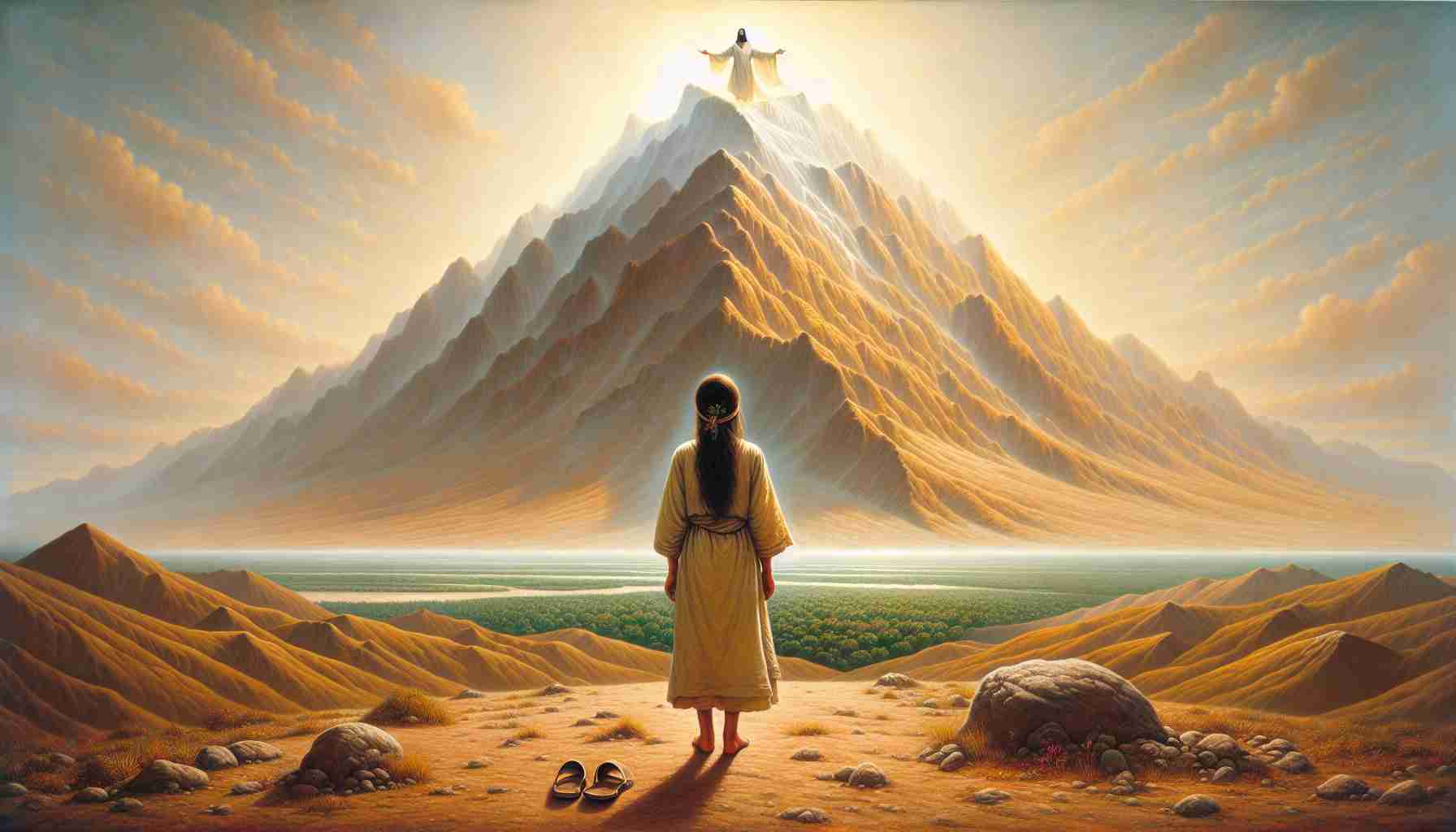

I stood at the edge of the crowd, just another face in the sea of Israelites spread across the valley. You wouldn’t know my name—I was just a water bearer, someone who walked behind the great ones, filling jars and guiding donkeys. But I saw Moses climb Mount Nevo that final morning.
I’d followed the camp east of the Jordan River, close to the plains of Moab. We were nearly there—so close to Canaan, the land of promise we had spoken of in whispers for forty years. My bones ached from the desert years, and my soul burned with hope. But Moses… he wasn’t allowed to enter.
It hurt to watch him walk up the mountain alone. Joshua stood beside me, his hands trembling. He had been chosen to lead us next. We didn't speak—what could we say?
When Moses reached the peak, he paused. He didn’t look back, only forward. The Torah—our sacred scroll—tells us in Deuteronomy 34 that God showed him the entire land: from Gilead in the north to the Negev in the south, as far west as the Mediterranean Sea, and even as far as Zoar. He saw every tree, every city, every promise.
But from where I stood, I only saw his silhouette against the sky.
I remember the ache in my chest that day. I wanted to scream—Why couldn’t he go in? He had brought us out of Egypt, led us through the Red Sea, received the Ten Commandments from God at Mount Sinai. He had pleaded for us when we built the golden calf, guided us with patience, even when we lost our faith. And now he was denied the land?
Later, I heard that it was because of an incident at the waters of Meribah long ago—when he struck the rock instead of speaking to it, as God had commanded. But it still felt unfair. It felt painful.
That evening, the elders said he died there, on the mountain. God buried him Himself, and no one knows where. Joshua wept. We all did.
But as the days passed, and hunger turned more to memory than pain, I found peace. I realized Moses didn’t need to walk into the land to complete his mission. Seeing it, with God by his side, was enough. He had brought us as far as any man could.
There was a power in that quiet ending. It taught me that sometimes the greatest leaders aren’t those who arrive, but those who prepare others to go on without them. Because of Moses, I could step forward. Because of his sacrifice, my children would eat from vines they didn’t plant and drink from wells they didn’t dig.
He saw the land, yes—but his legacy lives in every footstep we’re taking now.
And sometimes, that is even greater.
I stood at the edge of the crowd, just another face in the sea of Israelites spread across the valley. You wouldn’t know my name—I was just a water bearer, someone who walked behind the great ones, filling jars and guiding donkeys. But I saw Moses climb Mount Nevo that final morning.
I’d followed the camp east of the Jordan River, close to the plains of Moab. We were nearly there—so close to Canaan, the land of promise we had spoken of in whispers for forty years. My bones ached from the desert years, and my soul burned with hope. But Moses… he wasn’t allowed to enter.
It hurt to watch him walk up the mountain alone. Joshua stood beside me, his hands trembling. He had been chosen to lead us next. We didn't speak—what could we say?
When Moses reached the peak, he paused. He didn’t look back, only forward. The Torah—our sacred scroll—tells us in Deuteronomy 34 that God showed him the entire land: from Gilead in the north to the Negev in the south, as far west as the Mediterranean Sea, and even as far as Zoar. He saw every tree, every city, every promise.
But from where I stood, I only saw his silhouette against the sky.
I remember the ache in my chest that day. I wanted to scream—Why couldn’t he go in? He had brought us out of Egypt, led us through the Red Sea, received the Ten Commandments from God at Mount Sinai. He had pleaded for us when we built the golden calf, guided us with patience, even when we lost our faith. And now he was denied the land?
Later, I heard that it was because of an incident at the waters of Meribah long ago—when he struck the rock instead of speaking to it, as God had commanded. But it still felt unfair. It felt painful.
That evening, the elders said he died there, on the mountain. God buried him Himself, and no one knows where. Joshua wept. We all did.
But as the days passed, and hunger turned more to memory than pain, I found peace. I realized Moses didn’t need to walk into the land to complete his mission. Seeing it, with God by his side, was enough. He had brought us as far as any man could.
There was a power in that quiet ending. It taught me that sometimes the greatest leaders aren’t those who arrive, but those who prepare others to go on without them. Because of Moses, I could step forward. Because of his sacrifice, my children would eat from vines they didn’t plant and drink from wells they didn’t dig.
He saw the land, yes—but his legacy lives in every footstep we’re taking now.
And sometimes, that is even greater.